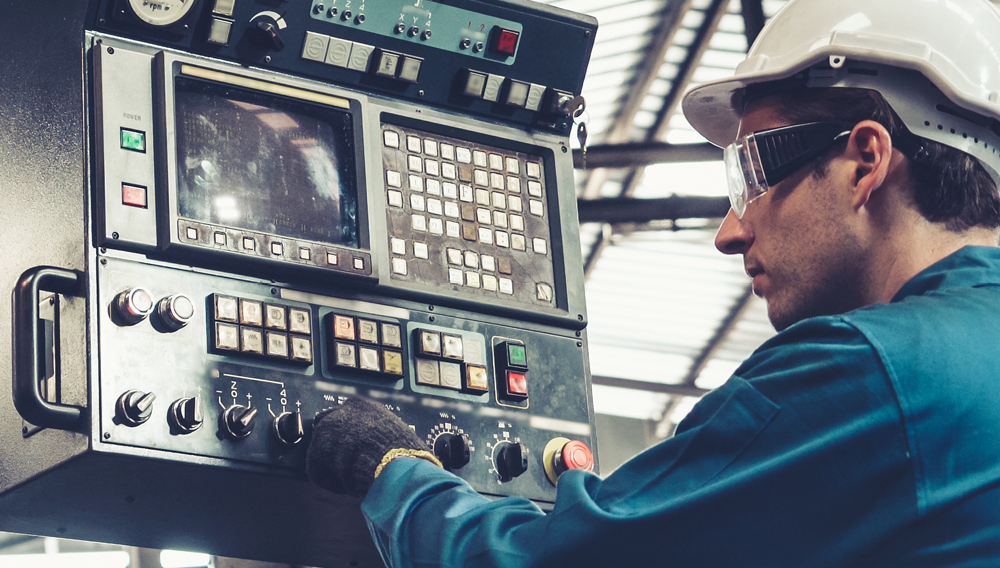In Australia’s manufacturing and production sectors, machine operators play a key role. They operate machinery, maintain quality, and ensure production runs smoothly. With a rising need for skilled workers, it’s vital to know what machine operators do and how to become one.
This section will give you an overview of the role. We’ll look at the essential skills, educational paths, and safety rules needed for success in this field.
Understanding the Role of a Machine Operator
Being a machine operator means handling many tasks in an industrial setting. These workers are key to making sure machines work well. They need to know their duties and the conditions they work in. Their skills help keep quality high and safety first.
Key Responsibilities of a Machine Operator
Machine operators have important jobs. Some of their main tasks are:
| Responsibility | Description |
|---|---|
| Monitoring Process | Operators watch machines closely to keep them running smoothly. |
| Conducting Safety Checks | They do regular safety checks to avoid accidents and follow rules. |
| Performing Maintenance | They do maintenance to keep machines working well for a long time. |
| Adjusting Operations | They adjust settings for the best performance and quality, based on the job. |
Working Environment and Conditions
The work environment for machine operators can change a lot. They work in places like factories, construction sites, and warehouses. These places can be tough, with:
- High noise levels, needing protective gear.
- Physical demands, like lifting heavy things.
- Strict safety rules that must always be followed.
Knowing about these challenges helps new machine operators get ready for their jobs. It also helps them do well in their roles.
Essential Skills for a Successful Machine Operator
To do well in machine operation, you need both technical and soft skills. Machine operators have to be good at many things. They need technical skills for the machines and soft skills for working with others.
Technical Skills and Knowledge
Technical skills are key for machine operation. Knowing how to use specific machines and understanding mechanical systems is important. Being able to read technical documents helps set up and fix machines right.
Knowing how to do basic repairs and solve problems is also crucial. It helps keep machines running smoothly and cuts down on downtime. These skills make manufacturing processes more efficient.
Soft Skills for Effective Operation
Soft skills are just as important as technical ones. Good communication helps teams work together better. It makes sure everyone knows what needs to be done.
Being able to manage your time well is also important. It helps keep things running smoothly. Being adaptable and a team player is key too. Machine operators often work together to meet goals and solve problems.
Educational Pathways to Becoming a Machine Operator
To start a career as a machine operator, you need a good education and training. First, finish your secondary school. This gives you the basics needed for the job. Then, look at different ways to improve your skills for this field.
Formal Education Requirements
Secondary school is a key step towards becoming a machine operator. Employers often look for people with a formal education. This includes maths and technical subjects, which help you understand complex machines.
Education for machine operators focuses on both theory and practice. This prepares you well for the job.
Vocational Training and Certifications
Vocational training is vital for machine operators. Courses like the Certificate III in Manufacturing Technology at TAFE are great. They mix theory with practical skills, helping you learn to operate machines effectively.
Certifications show you’re serious about your career. They make you stand out to employers. Also, keep learning to keep up with new technology in the industry.
Gaining Experience in the Machine Operating Field
Practical experience is key to success in machine operating. Getting hands-on skills boosts your experience. Internships, apprenticeships, and entry-level jobs are great starting points.
Internships and Apprenticeships
Internships let you see how things work in real life. They make your resume stronger and help you meet industry people. Apprenticeships give you formal training and a job while you learn.
They teach you about safety, maintenance, and how to use machines.
Entry-Level Positions to Consider
Starting as an assistant operator is a good first step. You learn from experts and gain skills. These jobs help you become more confident and skilled.
Volunteering Opportunities
Volunteering in maintenance or manufacturing is another way to gain experience. It lets you try out different machines and improve your skills. It shows you’re serious about the field and eager to learn.
Job Prospects and Salary Expectations for Machine Operators
The job market for machine operators in Australia is growing. This is due to the need for skilled workers in construction, manufacturing, and mining. Companies are looking for ways to be more productive and efficient.
Industry Demand in Australia
In Australia, the need for machine operators is increasing. This is because of more projects and new technology. The construction sector needs people who can use advanced machinery.
Manufacturing is also growing, thanks to automation and more production. Mining operations are expanding, creating a high demand for skilled machine operators. These professionals are key to safe and effective operations.
Averaging Salary Insights
The salary for machine operators varies based on experience, location, and industry. On average, they earn between $25 and $45 per hour. This means an annual salary of $52,000 to $94,000.
Those just starting out might earn less, while more experienced operators can earn more. Where you work also affects your salary. People in cities usually earn more than those in rural areas. Knowing this can help attract new talent and support current operators in their careers.
Safety Standards and Regulations for Machine Operators
Machine operators are key in many industries. They must follow strict safety rules to stay safe. The Work Health and Safety (WHS) regulations help make sure they work in safe places. It’s important for them to know these rules to keep everyone safe.
Understanding WHS Regulations
The WHS regulations tell employers and workers what they must do. They say who is responsible for keeping workplaces safe. Employers must find and deal with risks that come with using machines.
They also need to make sure all machines are safe for operators. This means doing regular checks and following safety standards.
Importance of Safety Training
Training operators in safety is very important. It helps prevent accidents at work. Good training teaches operators how to spot dangers and use machines safely.
Training covers things like wearing protective gear and what to do in emergencies. It helps make workplaces safer and promotes a culture of safety.
Conclusion
The role of a machine operator is key in many sectors in Australia. It offers lots of chances but needs a good grasp of technical skills and safety rules. To get ready for this job, you must learn how to use machines safely and effectively.
There are many ways to learn for those wanting to be machine operators. Vocational training, internships, and starting with simple jobs are good steps. Having the right skills and experience can really help you get ahead in this field.
If you’re thinking about being a machine operator, start by taking action. Look for courses and try to get practical experience. With hard work and the right preparation, you can have a great career in Australia’s fast-paced industries.


